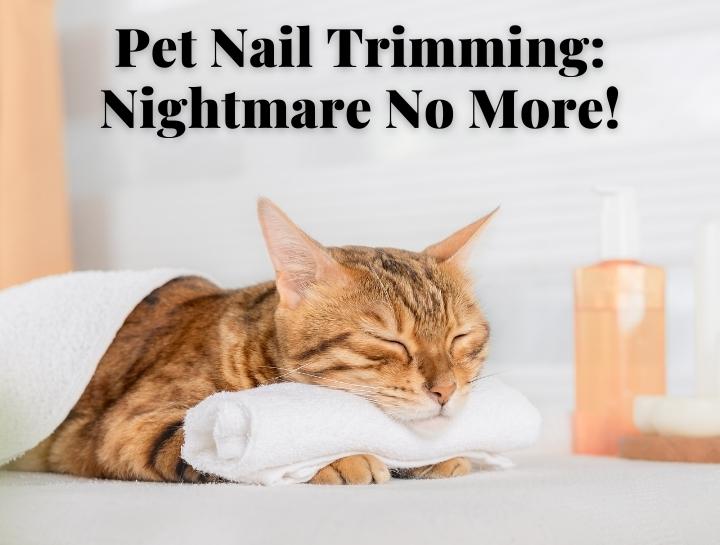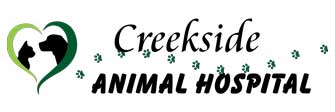Pet Nail-Trimming: Nightmare No More!

How to turn your pet's least favorite activity into a day at the spa.
It’s safe to say that nail trims are probably one of the most dreaded (but necessary) parts of caring for your pet! Paws are a very sensitive spot for dogs and cats and they have evolved to protect them. Even if you gently touch your pets’ paws, most will pull away. In fact, this is a normal reflex that we test by pinching the toe gently as part of a neurologic exam to ensure healthy nerve function (called the withdrawal reflex)!
A Typical Nail Trim
Consider the typical nail-trimming scenario: holding your pet's paw while maneuvering unfamiliar nail clippers toward their delicate digits. Then comes the precise positioning of the clippers, with the nail's quick in mind, followed by the delicate yet swift pressure to trim the nail. All of this, while hoping your pet remains still amidst the tension. It's undeniably a stressful undertaking, isn't it?
Nail trims at Creekside Animal Hospital look pretty similar to this but with a twist toward minimizing stress. We escort your pet to a designated treatment area, staffed with extra hands dedicated to making the experience less daunting. For dogs, this might involve a gentle hold on our elevated table, with treats or distractions in tow, and someone cautiously tending to the nails. Cats, on the other hand, may be cocooned in towels or permitted to shield their faces for added comfort.
When Vet Visits Turn Stressful
Our staff is trained to recognize subtle cues and changes in your pets’ body language that indicate early signs of stress. If we continue to push a pet through stressful situations by not listening to their early cues, then a pet may choose to bite in order to be “heard” by us. Even if your pet never tries to bite, the stress they feel will lead to heightened anxiety and fear each time they come back to the vet (even if there are no nail trims involved).
This situation can make it more difficult to do more important things like a very thorough physical exam, administering vaccines, or treating your pet if they become ill. Imagine if your pet comes in for licking their paws or limping. If we’ve previously stressed them out by just trimming nails, it will be very difficult to look at their paws when they may be painful or uncomfortable!
Making Pets More Comfortable
The journey to conquer this aversion is neither swift nor effortless, but it's feasible. Training, founded on positive reinforcement, stands as the pivotal step. Admittedly, vanquishing an existing fear is more intricate than evading it initially. For young animals, kittens, and puppies, preemptive measures can stave off such fears. Desensitization and acclimatization–gradually acquainting them with paw-handling–is the way to go.
What is desensitization and acclimatization? It is the process of helping your pet become comfortable with their feet being touched. Typically we are going to accomplish this by showing them that good things happen when we touch their feet. The instructions below come from Fear Free Pets, an organization dedicated to preventing and alleviating stress and anxiety in pets, especially the stress associated with veterinary experiences. We also recommend using a professional trainer to help with this as it is very important to go at your pets’ individual pace.
We have also included some links below to various organizations trying to help alleviate this stress point for our pets.
Fear Free Pets
Sophia Yin - watch a veterinary team demonstrate a positive reinforcement technique to help teach the dog that nail trims come with treats, not pain.
Extra Help for Nail Trims
When done correctly, training techniques can be very effective to reduce stress. This involves a lot of time and effort on your part but is very rewarding.In some cases, pets may be too stressed to engage in training. This is where we can use certain medications to calm your pets’ nerves. If your pet is in a better mindset to learn at home, you are likely to make more progress. These medications may even make your pet feel so calm that we can safely and calmly proceed with the nail trim at Creekside Animal Hospital.
Common medications prescribed by our veterinarians are trazodone and gabapentin. It is important to follow the instructions of the medications exactly as prescribed, otherwise, they may not have the desired effect. It is also important to note that not all medications and doses work the same for each pet. Sometimes we have to change doses or add other medications to ensure your pet is calm enough.
Unfortunately, some pets have developed such strong fears that even oral calming medications aren’t enough to facilitate stress-free nail trims here at our hospital. In those cases, we will recommend injectable sedation so that your pet doesn’t have to be awake for the stressful experience. We will usually save this as a last resort and still strongly recommend the use of oral medications and training at home before going this route.
At Creekside Animal Hospital, we strive to always do what is best for your pets, both physically and mentally. We want your pet to enjoy coming to the vet as much as possible! While they may not come to truly enjoy the nail trims, we can at least ensure that they are as stress-free as possible for your fur babies with the tips outlined above. We appreciate you working with us to provide the most calm care for you, your pet, and our staff!
Article written by Northeast Animal Hospital
